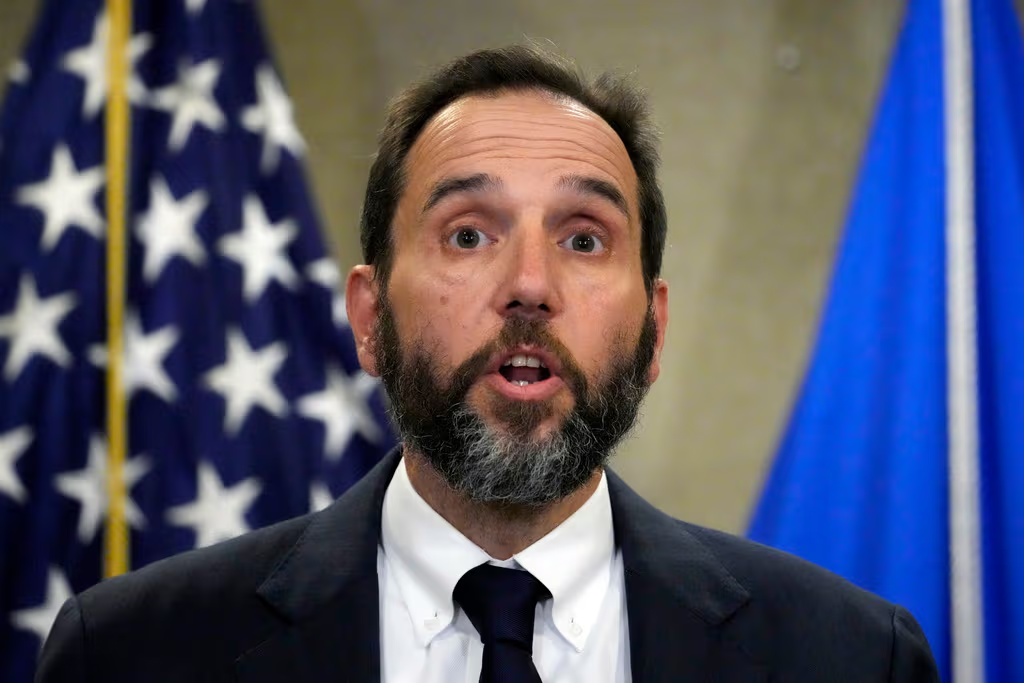Judge Cannon Could Be Placating Jack Smith Now To Deliver Trump a Double Jeopardy Victory Later
By choosing to deny a motion to dismiss, the jurist could be setting the stage for a more dramatic ruling during trial.

Judge Aileen Cannon’s denial of President Trump’s motion to dismiss the Mar-a-Lago charges against him as unconstitutionally vague is a victory for Special Counsel Jack Smith, but it could spell a downstream double jeopardy headache for the prosecutor once Mr. Trump is in front of a jury.
Judge Cannon dismissed Mr. Trump’s motion “without prejudice,” meaning that it can be refiled at a later date. “With prejudice” would have foreclosed that option. She ventured that “serious consideration” is warranted in respect of his contention that the Espionage Act as applied to a former president is fatally vague.
Here, though, Judge Cannon’s language is itself vague. She writes that the “resolution of the overall question presented depends too greatly on contested instructional questions about still-fluctuating definitions of statutory terms/phrases as charged, along with at least some disputed factual issues.” That sounds less like a dismissal of the motion to dismiss than a postponement of it.
The jurist’s refusal to “prematurely decide now” whether the Espionage Act, signed into law by President Wilson in 1917, is infected with “unsalvageable vagueness” could signal that the issue will be a major one at trial. The constitutional requirement of due process and the criminal law’s bedrock rule of lenity — ambiguities are to be resolved in the defendant’s favor — mean that vague statutes are generally treated with judicial skepticism.
Judge Cannon has not yet set a trial date for the Mar-a-Lago case. Mr. Trump is accused of violating 32 counts of the Espionage Act, as well as several obstruction statutes. Nevertheless she previewed the possible reemergence of the issue during trial, “to be raised as appropriate in connection with jury instruction, briefing and / or other appropriate motions.”
The short order — it comprises only a page and a half — puts into sharp relief an emerging strategy for the judge, who appears to be cannily foreclosing opportunities for Mr. Smith to appeal adverse rulings to the United States Court of Appeals for the 11th Circuit, which oversees the jurist. That tribunal has already overruled her in respect of the appointment of a special master to supervise the prosecution at an earlier stage of the case.
Judge Cannon could also be cogitating on a crucial constitutional caveat. The Supreme Court has ruled that the national parchment’s prohibition of double jeopardy attaches only after a jury is sworn in, or, in a bench trial, after the first witness begins to testify. The Constitution ordains that “No person shall … be subject for the same offense to be twice put in jeopardy of life or limb.”
If a jury, then, acquits Mr. Trump on account of the Espionage Act being vague, Mr. Smith would not be able to refile the charges, lest he run afoul of double jeopardy. Alternatively, Judge Cannon could decide to, at a more advanced point in the trial, dismiss the charges with prejudice.
While that could be appealed to the 11th Circuit, it would put the case on the thinnest of ice pending appellate review. During a hearing last week, Judge Cannon acknowledged that “declaring that a statute is unconstitutionally vague is quite an extraordinary step.”
It is more likely that Judge Cannon would take such a step than, say, 12 of Mr. Trump’s peers on a jury. That’s because, per the ancient arrangement of the common law, the jury is the trier of fact and the judge is the decider of law. This means that a jury can decide if Mr. Trump violated the Espionage Act, but it is likely Judge Cannon’s decision as to whether the law is constitutional.
In a separate case in a different jurisdiction, Mr. Trump has raised a more exotic species of double jeopardy. He does so in respect of his January 6 trial, where the 45th president argues that the Senate’s acquittal of him on charges of insurrection handed up in an impeachment precludes his further prosecution on criminal charges.
Mr. Trump, who so far has failed to persuade a court to vindicate his position, points to the Constitution’s Impeachment Judgment clause, which ordains that the “Party convicted shall nevertheless be liable and subject to Indictment, Trial, Judgment and Punishment, according to Law.” Mr. Trump wasn’t a “party convicted” but a “party acquitted” of incitement to insurrection.

